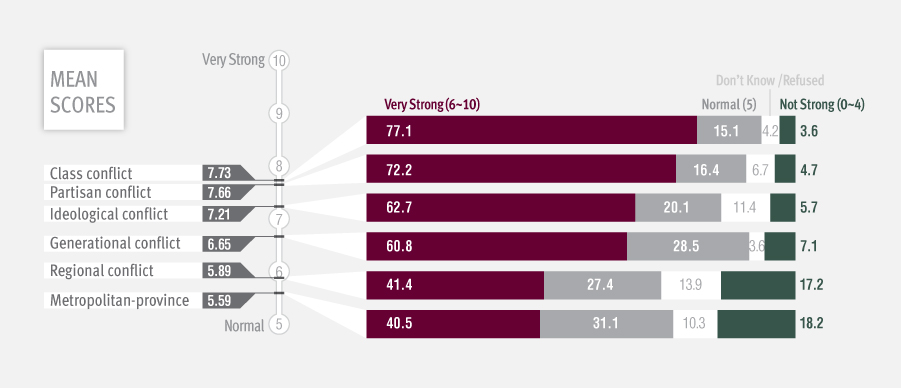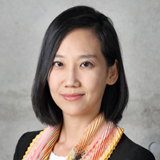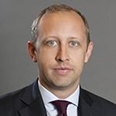
Sources of Social Conflict
-
Issue/Region :
Culture and Society/Korean Peninsula
-
By.
Kim Jiyoon / Research Division, Karl Friedhoff / Chicago Council on Global Affairs

SOURCE OF SOCIAL CONFLICT
July 16-18
On a scale of 0 to 10, how do you perceive the intensity of the following divisions?
(%)
To unite the nation, President Park Geun-Hye must address Korea’s various political, economic, and social divisions. Polls reveal Koreans perceive class, partisanship, ideological, and generational divisions to be relatively intense
Respondents rated class division between the rich and poor (7.73) as the most intense, then in descending order, the partisan divide (7.66), the ideological divide (7.21), and the generational divide (6.65). Meanwhile, regional division between Youngnam and Honam (5.89) and the metropolitan-province division (5.59) scored closer to “normal”. While over 60% of respondents gave scores of 6 or above for class division (77.1%), partisan division (72.2%), ideological division (62.7%), and generational division (60.8%), only 40% of respondents rated the regional and metropolitan-provincial divides as 6 or above.
METHODOLOGY
- The sample size of each survey was 1,000 respondents over the age of 19.
- The surveys were conducted by Research & Research, and the margin of error is ±3.1% at the 95% confidence level.
- All surveys employed the Random Digit Dialing method for mobile and landline telephones.
3-day rolling average?
The sample size of each survey was 1,000 respondents over the age of 19. The surveys were conducte d by Research & Research, and the margin of error is ±3.1% at the 95% confidence level. All surveys employed the Random Digit Dialing method for mobile and landline telephones.
This brief is a product of the Public Opinion Studies Center at the Asan Institute for Policy Studies.
Contact Karl Friedhoff at klf@asaninst.org.

 Facebook
Facebook Twitter
Twitter

